- Home
- Paolo Bacigalupi
Tool of War
Tool of War Read online
Copyright
This book is a work of fiction. Names, characters, places, and incidents are the product of the author’s imagination or are used fictitiously. Any resemblance to actual events, locales, or persons, living or dead, is coincidental.
Copyright © 2017 by Paolo Bacigalupi
Cover art copyright © 2017 by Cliff Nielsen. Cover design by Karina Granda. Cover copyright © 2017 by Hachette Book Group, Inc.
Hachette Book Group supports the right to free expression and the value of copyright. The purpose of copyright is to encourage writers and artists to produce the creative works that enrich our culture.
The scanning, uploading, and distribution of this book without permission is a theft of the author’s intellectual property. If you would like permission to use material from the book (other than for review purposes), please contact [email protected]. Thank you for your support of the author’s rights.
Little, Brown and Company
Hachette Book Group
1290 Avenue of the Americas, New York, NY 10104
Visit us at lb-teens.com
First Edition: October 2017
Little, Brown and Company is a division of Hachette Book Group, Inc. The Little, Brown name and logo are trademarks of Hachette Book Group, Inc.
The publisher is not responsible for websites (or their content) that are not owned by the publisher.
Library of Congress Cataloging-in-Publication Data
Names: Bacigalupi, Paolo, author.
Title: Tool of war / Paolo Bacigalupi.
Description: First edition. | New York : Little, Brown and Company, 2017. | Companion to: Ship breaker and The Drowned Cities. | Summary: In a future beset with rising seas, corporate government, and constant civil war, a bioengineered half-man/half-beast super-soldier who calls himself Tool breaks his conditioning to overcome his genetically enhanced sense of loyalty to the corporation that created him and seeks revenge against his old masters.
Identifiers: LCCN 2016051846| ISBN 9780316220835 (hardcover) | ISBN 9780316220828 (ebook) | ISBN 9780316364775 (library edition ebook)
Subjects: | CYAC: Genetic engineering—Fiction. | Obedience—Fiction. | Soldiers—Fiction. | Survival—Fiction. | Science fiction.
Classification: LCC PZ7.B132185 To 2017 | DDC [Fic]—dc23
LC record available at https://lccn.loc.gov/2016051846
ISBNs: 978-0-316-22083-5 (hardcover), 978-0-316-22082-8 (ebook)
E3-20170831-JV-PC
Contents
Cover
Title Page
Copyright
Chapter 1
Chapter 2
Chapter 3
Chapter 4
Chapter 5
Chapter 6
Chapter 7
Chapter 8
Chapter 9
Chapter 10
Chapter 11
Chapter 12
Chapter 13
Chapter 14
Chapter 15
Chapter 16
Chapter 17
Chapter 18
Chapter 19
Chapter 20
Chapter 21
Chapter 22
Chapter 23
Chapter 24
Chapter 25
Chapter 26
Chapter 27
Chapter 28
Chapter 29
Chapter 30
Chapter 31
Chapter 32
Chapter 33
Chapter 34
Chapter 35
Chapter 36
Chapter 37
Chapter 38
Chapter 39
Chapter 40
Chapter 41
Chapter 42
Chapter 43
Chapter 44
Chapter 45
Epilogue
Acknowledgments
1
THE DRONE CIRCLED high above the wreckage of war.
A week before, it hadn’t been there. A week before, the Drowned Cities hadn’t been worth mentioning, let alone worth committing drones to overwatch.
The Drowned Cities: a coastline swamped by rising sea levels and political hatreds, a place of shattered rubble and eternal gunfire. It had been a proud capital, once, and the people who inhabited its marble corridors had dominated much of the world. But now the place was barely remembered on maps, let alone in places where civilized people gathered. The histories it had dominated, the territories it had controlled, all had been lost as its people descended into civil war—and eventually were forgotten.
And yet now a Raptor-class oversight drone circled overhead.
Held aloft by humid thermals, the drone surveyed brackish jungles and eroded coastlines. It circled, wings stretched wide to catch hot Atlantic winds. Its cameras swept across kudzu-tangled swamps and emerald mosquito-infested pools. Its gaze lingered on marbled monuments, spikes and domes and toppled columns, the shattered bones of the city’s greatness.
At first, the reports had been dismissed as nothing but war-addled refugee accounts: a monster that led child soldiers to victory after victory; a beast that was immune to bullets, that tore enemies limb from limb. A towering savage creature that demanded an unending tribute of enemy skulls…
No one believed, at first.
But later, blurry satellite photos showed buildings burning and troops on the move, and gave confirmation to even the most outlandish accounts. And so the drone came seeking.
The electronic vulture wheeled, high and lazy, its belly bulging with cameras and heat sensors, laser microphones and radio-intercept equipment.
It photographed historic rubble and barbarous inhabitants. It eavesdropped on bursts of radio communication, parsing the movements of troops, the patterns of explosions. It tracked lines of gunfire, and video-recorded the dismembering of enemy soldiers.
And far away—across the continent—the information the Raptor gathered was received by its masters.
There, a great dirigible floated, majestic above the Pacific Ocean. The name on its side was as grand as the warship itself: ANNAPURNA.
A quarter of the planet lay between the command dirigible and the spying Raptor, and yet the information arrived in an eyeblink, and set off alarms.
“General!”
The analyst pushed back from her control screens, blinking, wiping sweat from her brow. Mercier Corporation’s Global Strategic Intelligence Center was hot with computing equipment and the shoulder-to-shoulder press of other analysts, all at their own workstations, all busy with their own operations. The murmur of their work filled the room, along with the labored whir of clean-room fans that fought to cool the place. The Annapurna prized efficiency of space and maximum eyes-and-ears over comfort, and so all of them were sweating, and none of them complained.
“General!” the analyst called again.
At first she’d resented the wild-goose chase she’d been assigned—an exercise in busywork, while her fellow intelligence analysts foiled revolutions, wiped out insurgents, and fought off price runs on lithium and cobalt markets. They’d made fun of her task—in the mess hall, in the bunkrooms, in the showers—heckling her for not contributing to the bottom line, reminding her that her quarterly profit bonus would be zero for failing to contribute to company profits.
Privately, she’d agreed glumly with them all.
Until now.
“General Caroa! I think I’ve got something.”
The man who responded was tall, his company blues perfectly pressed. Rows of medals gleamed on his chest, marking a bloody rise through Mercier’s military ranks. His blond hair, fading to white, was cropped short, the habit of a lifetime of discipline, but the neatness of his personal appearance was marred by his face—a sloppy stitch-work of pink scar tissue, pocks, and puckered divot
s where battle surgeons had done their best to keep his pale features intact.
His face, if not tidy, was at least almost whole.
The general leaned over her shoulder. “What have we got?”
The analyst swallowed, unnerved by the man’s cold gaze. “It’s the augment,” she said. “The one you flagged.”
“You’re sure?”
“It’s almost an exact physical match.” She brought up the drone’s live feed. A bestial face filled the screen. “It has to be the one.”
The image was grainy, but considering the distance and angle, their view of the monster was a miracle of technological wizardry. The augment could as well have been photographed from twenty feet away—a monster standing nearly eight feet tall, massively muscled. A combination of dog and human, tiger and hyena DNA. A battle terror, clawed and fanged and brutal.
“So, old friend, we meet again,” the general murmured.
One of the creature’s eyes was scarred shut. Other old wounds showed on its arms and face, giving the creature the appearance of one who had battled through hell and emerged victorious on the far side.
The analyst said, “I have this much of the design code, also.” She pulled up a close image of the augment’s ear: rows of numbers, tattooed. “Is this the one you wanted? Does it match?”
The general stared at the screen. His hand, seemingly of its own accord, had reached up to touch his own ravaged face, fingers lingering on a puckered scar line that started at his jaw and ran down his neck. Divots and pocks of missing flesh as if his head had once been trapped in the jaws of a monstrous wild animal.
“Sir?” the analyst pressed eagerly. “This is the target, right?”
The general gave her a sour look. Her uniform tag read JONES, ARIAL. No medals. No experience. Young. Another bright recruit, harvested into the security forces of Mercier, courtesy of the aptitude tests the company offered in its protectorate territories. She was driven, thanks to whatever hellhole she’d climbed out of to join Mercier, but she didn’t know true battle. Unlike him. Unlike the creature they studied on the screen. So of course she was eager; she’d never been to war.
“That’s the one,” General Caroa confirmed. “That’s our target.”
“He looks like a tough one.”
“One of the toughest,” Caroa agreed. “What assets do we have?”
Jones checked her status screens. “We can put two Strike Raptors up within twenty minutes,” she said. “We can launch from the Karakoram in the Atlantic.” She was smiling. “Havoc on your order, sir.”
“Time to target?”
“Six hours.”
“Very good, Jones. Flag me when the Raptors are on station.”
2
TOOL’S EARS PRICKED, tracking distant gunfire, the comfortable conversational chatter of the Drowned Cities.
It was a polyglot language, but Tool understood all of its voices. The ratchet exclamations of AK-47s and M-16s. The blunt roar of 12- and 10-gauge shotguns. The authoritative crack of 30-06 hunting rifles, and the snapping of .22s. And of course, over it all, the incoming shriek of 999s, the voice that ended all other combat sentences with booming punctuations.
It was a familiar conversation that flowed back and forth—ask and answer, insult and retort—but over the last few weeks the conversation had changed. Increasingly, the Drowned Cities spoke Tool’s language only. The bullet patois of his troops, the battle slang of his pack.
The war roared on, but the voices were merging now, becoming a single harmonious howl of triumph.
Of course, there were other sounds as well, and Tool heard them all. Even in the atrium of his palace, far from the battlefront, he could follow the progress of his war. His large ears were better than a dog’s, and were always pricked tall, wide and sensitive, telling him much that human ears could not, much as all his senses gathered more than any human senses could.
He knew where his soldiers stood. He smelled their individuality. He could sense their movements by the way air currents shifted across his fur and skin. In the darkness he could see them, his eyes sharper than a cat’s in the blackest night.
These human beings he led were blind and deaf to most things, but still he led them, and tried to fashion them into something useful. He had helped his human children to see, to smell, to listen. He had taught them to yoke their eyes and ears and weapons to one another, so that they fought as Fangs and Claws and Fists. Units. Platoons. Companies. Battalions.
An army.
Through the gap in the cracked dome of his palace, Tool could see the bellies of storm clouds, glowing orange, reflecting fires raging, the Army of God’s last desperate attempt to stop his troop’s advance by creating a battle line of self-destruction.
Thunder rumbled. Lightning spiked across the clouds. A hurricane was building, the second in as many weeks, but it wouldn’t come soon enough to save the Army of God.
Behind him, Tool heard footsteps hurrying down marble corridors, coming his way. The limp and scrape of the person’s uneven gait told him it was Stub. Tool had promoted the boy to command staff because he was hard and sharp and clever, and had been brave enough to storm the barricades on K Street.
Koolkat had led the charge when the Army of God threatened to break through and destroy their then-fragile hope, and had died for it. Beside him, Stub had lost a foot to a mine, and yet had tourniqueted himself, and then still dragged himself forward, rallying his fellows to fight on, even after their commanding officer had died. Ferocious and dedicated and brave.
Yes, it was Stub—he had the right scent, and the right limp—but another scent accompanied the soldier boy—fresh-congealing blood, the iron spike telltale of new carrion.
Stub bore a message.
Tool closed his one good eye and breathed deep, enjoying the scent and the moment—the bite of gunpowder, the growl and swelter of the brewing storm, the rich ozone tang of lightning burning the air. He breathed deep, trying to fix the moment of triumph in his mind.
So many of his memories were fragmented, lost to wars and violence. His history was a kaleidoscopic jumble of images and scents and roiling emotions, scattershot explosions of joy and terror, much of it blocked and inaccessible now. But this time—this one time—he wanted to secure the entirety of the moment permanently in his mind. To taste and smell and hear it. To let it fill him com-pletely, straightening his spine, letting him stand tall. To let it fill his muscles with power.
Triumph.
The palace he stood in was a ruin. Once it had been grand, marble floors, majestic columns, ancient masterful oil paintings, a graceful rotunda. Now he stood under a shattered dome, and could survey the city he warred for, thanks to a bombed-out wall. He could see right out to the ocean where it lapped below, on his very front steps. Rain spattered in and made thin, slippery pools on the floors. Torches guttered in the damp, giving light for the human beings, so that they could see the barest edges of what Tool could see without any aid at all.
A tragic ruin, and a site of triumph.
Stub waited respectfully.
“You have news,” Tool said without turning.
“Yes, sir. They’re finished. The Army of God… they’re done for.”
Tool’s ears twitched. “Why do I still hear gunfire?”
“Just mop-up,” Stub said. “They don’t know when they’re beat. They’re dumb, but they’re tenacious.”
“You believe them truly defeated?”
The boy laughed shortly. “Well, Perkins and Mitali sent this for you.”
Tool turned. Stub lifted the object he was carrying.
General Sachs’s severed head stared emptily out at his surroundings, forlorn without his body. The last warlord of the Drowned Cities. The man’s expression was frozen somewhere between shock and horror. The green cross of protection that the warlord had painted on his forehead was smudged with blood.
“Ah.” Tool took the head and tested its weight in his palm. “It seems his One True God did not save
him. Not such a savior prophet after all.”
A pity not to be there at the last. To miss the chance to tear the man’s heart from his chest and feed upon it. To gain sustenance from his enemy. Even now, the urge was strong in Tool. But killing glory was the privilege of the Claws. He was a general now, sending Fists and Claws and Fangs into battle as he had once been sent, and so he missed out on the adrenaline rush of combat, the hot blood of slaughter spurting joyous between his jaws…
Tool sighed regretfully.
It is not your role to strike the killing blow.
Still, there was this small pleasure—one general looking the other in the eye, accepting surrender.
“‘Against nature,’ I think you said of me,” Tool mused. “‘An abomination.’” He lifted the head higher, peering into Sachs’s horrified dead eyes. “‘The patchwork Frankenstein that would not stand.’ And of course, ‘Blasphemy.’”
Tool bared his teeth, pleased. The man had lived in denial until the last, believing himself a child of God, made in God’s own image, divinely protected from the likes of Tool. “It seems his One True God favored blasphemy best.”
Even now, Tool thought he could see the glimmer of denial in the dead general’s eyes. The wailing tantrum at the unfairness of being forced to fight a creature that had been designed to be faster, smarter, and tougher than the poor human warlord who had thought himself blessed.
This simple man hadn’t been able to grasp that Tool had been optimized for an ecosystem of slaughter. Tool’s gods had been far more interested in modern warfare than this sad man’s focus of worship. Such was the way of evolution and competition. One species replaced another in the blink of an eye. One evolved; one died out.
But then, the concept of evolution had never been the general’s strong suit, either.
Some species are meant to lose.
A heavy boom shook the air. Tool’s 999. The foundation of the palace trembled.
The city fell quiet.
And remained so.
Stub looked up at Tool in surprise. Tool’s ears twitched, listening. Nothing. No gunfire. No mortar launches. Tool strained his senses. With the storm coming, the breeze carried an electric sense of anticipation, as if waiting for violence to resume—and yet now, finally, the Drowned Cities were silent.

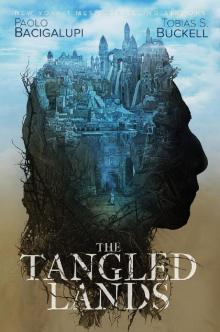 The Tangled Lands
The Tangled Lands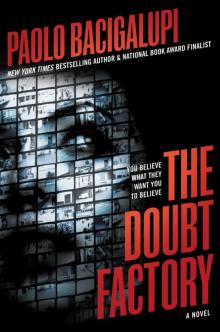 The Doubt Factory
The Doubt Factory Windup Stories
Windup Stories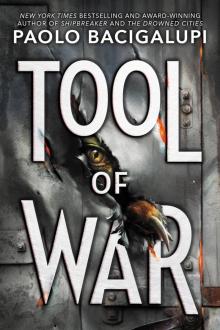 Tool of War
Tool of War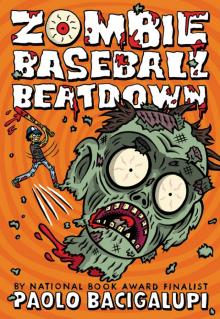 Zombie Baseball Beatdown
Zombie Baseball Beatdown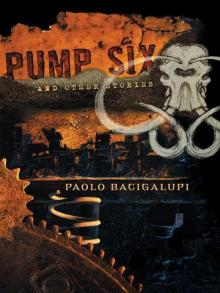 Pump Six and Other Stories
Pump Six and Other Stories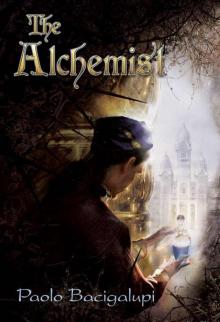 The Alchemist
The Alchemist The Windup Girl
The Windup Girl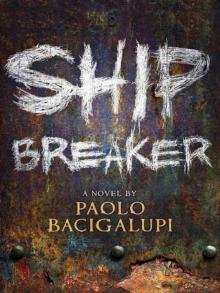 Ship Breaker
Ship Breaker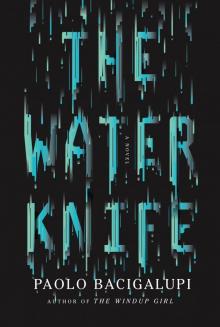 The Water Knife
The Water Knife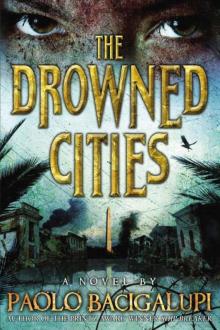 The Drowned Cities sb-2
The Drowned Cities sb-2